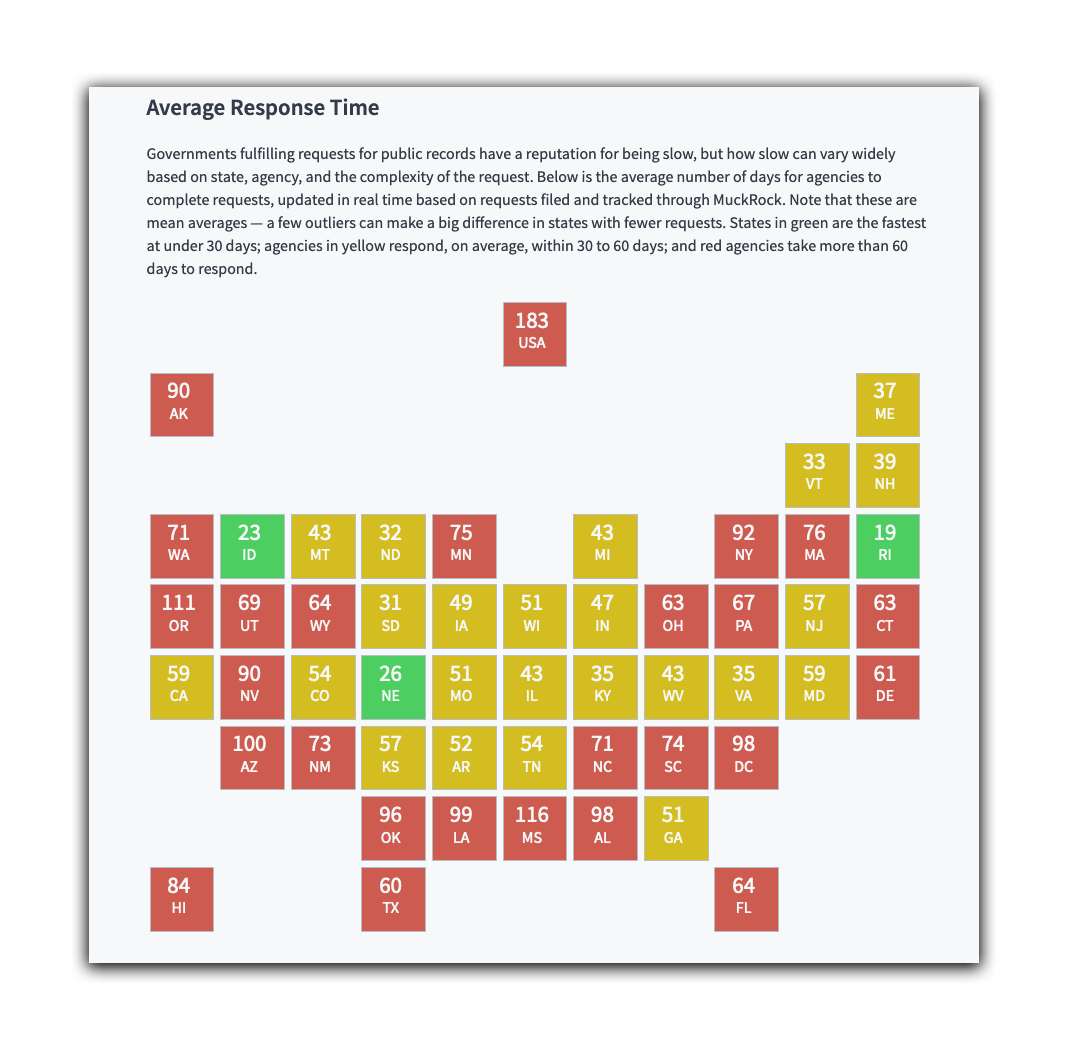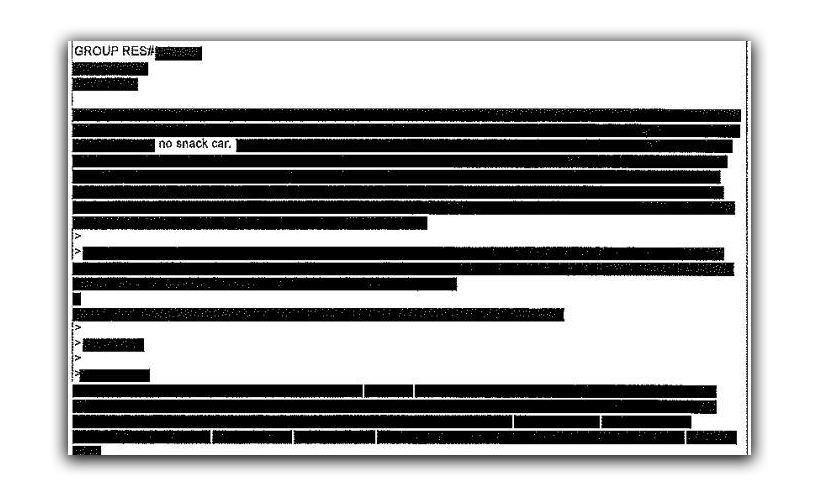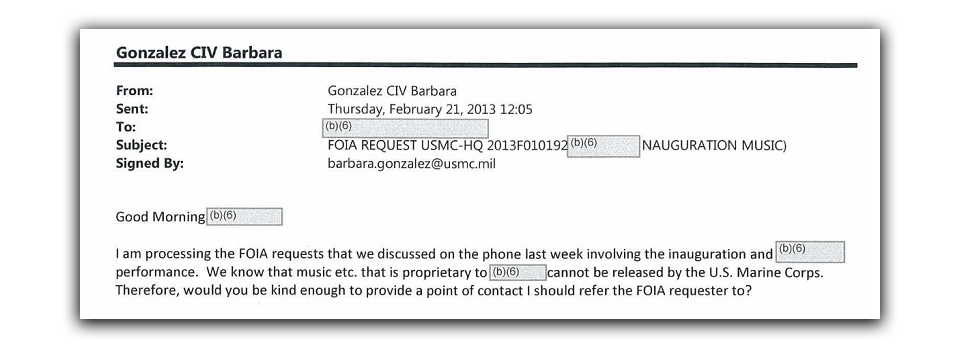Freedom of Information Act
FOIA stands for the Freedom of Information Act, a national law (5 U.S.C. § 552) that requires federal agencies to make available information to the public with some exceptions.
FOIA is now used as a colloquialism in the United States as any type of request for information from any government agency. However, it is important to note that officially, FOIA law pertains only to federal agencies. State and local agencies have their own FOIA rules.
FOIA or Public Records Act (PRA) requests come in three forms:
- Federal level — Freedom of Information Act (FOIA), 5 U.S.C. § 552. The First Amendment gives rights of access, motions to unseal records, etc.
- State level — California Public Records Act (CPRA), in California the law is Cal. Gov. Code § 6250 et seq., and is different from state to state.
- Local ordinances — Public Records Requests (PRA), also called sunshine ordinances, like:
- San Francisco Admin. Code § 67 (Sunshine Ordinance),
- Richmond, California’s Code of Ordinances Article II Chapter 2.40 Public Information
- Oakland’s Sunshine Ordinance cited as Ord. 12483 (part), 2003; Ord. 11957 § 00.2, 1997
“The basic purpose of FOIA is to ensure an informed citizenry, vital to the functioning of a democratic society, needed to check against corruption and to hold the governors accountable to the governed.”
N.L.R.B. v. Robbins Tire & Rubber Co., 437 U.S. 214, 242 (1978)

The website MuckRock provides information about FOIA laws for each state.
National FOIA Agencies
“Each authority of the Government of the United States, whether or not it is within or subject to review by another agency” 5 U.S.C. § 551(1)
While FOIA covers most agencies, there are some exceptions:
Includes:
- Executive and military departments
- Government corporations (i.e. Amtrak) or Government-controlled corporations
- Independent regulatory agencies 5 U.S.C. § 552(f)(1)
- Congress
- Courts
- Territories or possessions of the United States (e.g. Puerto Rico)
- Government of the District of Columbia;
- Some parts of the Executive Office of the President
- Courts martial and military commissions;
What Records Fall Under FOIA?
The allowable definition is ambiguous, “Any info . . . maintained by an agency in any format, including an electronic format.”
However, there are exceptions:
THE BIG NINE: Exemptions
- b(1) National security information
- b(2) Internal personnel rules and practices
- b(3) Information exempt under other laws
- b(4) Confidential business information
- b(5) Privileged inter- or intra-agency communications
- b(6) Personal privacy
- b(7) Law enforcement records
- b(8) Financial institutions
- b(9) Geological information
Per the FOIA.gov website:
Exemption 1: Information that is classified to protect national security.
Exemption 2: Information related solely to the internal personnel rules and practices of an agency.
Exemption 3: Information that is prohibited from disclosure by another federal law.
Exemption 4: Trade secrets or commercial or financial information that is confidential or privileged.
Exemption 5: Privileged communications within or between agencies, including those protected by the:
- Deliberative Process Privilege (provided the records were created less than 25 years before the date on which they were requested)
- Attorney-Work Product Privilege
- Attorney-Client Privilege
Exemption 6: Information that, if disclosed, would invade another individual’s personal privacy.
Exemption 7: Information compiled for law enforcement purposes that:
- 7(A). Could reasonably be expected to interfere with enforcement proceedings
- 7(B). Would deprive a person of a right to a fair trial or an impartial adjudication
- 7(C). Could reasonably be expected to constitute an unwarranted invasion of personal privacy
- 7(D). Could reasonably be expected to disclose the identity of a confidential source
- 7(E). Would disclose techniques and procedures for law enforcement investigations or prosecutions, or would disclose guidelines for law enforcement investigations or prosecutions if such disclosure could reasonably be expected to risk circumvention of the law
- 7(F). Could reasonably be expected to endanger the life or physical safety of any individual
Exemption 8: Information that concerns the supervision of financial institutions.
Exemption 9: Geological information on wells.
Timeline for Determination
The government is required to respond by 20 working days. Agency can have up to 10 more working days, if it invokes and explains “unusual circumstances” are present (which it often does).
Potential Responses

Via MuckRock’s FOIA redaction of shame
Potential responses to your FOIA request:
- Silence
- “Glomar” response (We cannot confirm or deny existence of those records).
- Denial of Request (often occurs)
- Records-Related Responses
- Documents released in full
- Documents released in part
- Documents withheld in full
- Agency found no documents responsive to your request
If redacted, each redaction needs to include information as to the legal exception it is citing to justify those redactions. This can be challenged in court if needed.

In the above example, a FOIA request was made by the Times of London for a performance pop singer Beyonce had given during the second inauguration of former president Obama. The Times was trying to find out if she had lip synced. In the reply, the Navy (who organized the event) decided Beyonce’s name was to be redacted for personal privacy reasons.

The ‘Always Appeal Denials’ Philosophy
Most FOIA experts will encourage journalists to always appeal denials. This keeps the request in the system and creates opportunities for potentially releasing records in the future.
The determination letter (rejection) will inform you of your right to appeal.
Note: You must file an administrative appeal in time specified if you want relief.
Your appeal should include:
- Statement that it’s an appeal and statutory reference (5. U.S.C. § 552(a) (6))
- The request reference number
- Background on denial (can include denial letter as an attachment)
- Argument in support of appeal
- Any additional materials
- Your contact information
You can also resort to litigation. If you exhausted administrative remedies, can sue to enforce request / challenge agency withholdings
Note: Litigation can be expensive and time consuming.
- Usually quicker than most federal cases
- $400 filing fee in federal court
- Cases concluded by settlement or summary judgment (no trials)
- Attorney’s fees may be recoverable
FOIA Strategies
Here are the basic parts of a FOIA request:
1. Statement of Request
- Clearly indicate you are making a request pursuant to the Freedom of Information Act (invoke statute by name)
- Describe Records Sought
- Be clear and specific about what you want • Make sure request is reasonable
- Include date range
- Ask for particular format of records
Requesters must ask for existing records. Requests may have to be carefully written in order to obtain the desired information. Sometimes, an agency will help a requester identify a specific document that contains the information being sought. Other times, a requester may need to be creative when writing a FOIA request in order to identify an existing document or set of documents containing the desired
information.
There is a second general limitation on FOIA requests. The law requires that each request must reasonably describe the records being sought. This means that a request must be specific enough to permit a professional employee of the agency who is familiar with the subject matter to locate the record in a reasonable period of time.
2. Fee Status / Waiver
- Explicitly indicate status as a “representative of the news media” pursuant to 5 U.S.C. § 552(a)(4)(A)(ii)
- You must be willing to pay for duplication costs ~$0.10–$0.35/page, but you can set a cap. Do not pay search costs.
- Public Interest Fee Waivers / Fee Reductions (Good if you’re a student doing research)
- Explicitly indicate you’re seeking a public interest fee waiver pursuant to 5 U.S.C. § 552(a)(4)(A)(iii)
- Describe scholarly, historical, or current public interest served by request
- Describe significance of contribution to public understanding
3. Request for Expedited Processing
- 5 U.S.C. § 552(a)(6)(E) permits requests for expedited processing if requester establishes a “compelling need”
- Compelling need includes:
- Failure to obtain requested records on an expedited basis “could reasonably be expected to pose an imminent threat to the life or physical safety of an individual”
- If request is made by a ”person primarily engaged in disseminating information” there is “urgency to inform the public concerning actual or alleged Federal Government activity”
- Must certify that statements about alleged activity / public concern are true
Verify your commitment to Pay Fees Contact Information
Basic FOIA Template
This is a rough starting template for FOIA document. Note: This is not a sure-fire FOIA template. You should customize your letter to include all of the necessary components.
Agency Head [or Freedom of Information Act Officer]
Address of Agency
City, State, Zip Code
Re: Freedom of Information Act Request
Dear ______________:
This is a request under the Freedom of Information Act pursuant to 5 U.S.C. § 552.
I request that a copy of the following documents [or documents containing the following information] be provided to me: [identify the documents or information as specifically as possible].
• Be clear and specific about what you want
• Make sure request is reasonable
• Include date range
• Ask for particular format of records
In order to help to determine my status to assess fees, you should know that I am a representative of the news media affiliated with the ___________ (newspaper, magazine, television station, etc.) 5 U.S.C. § 552(a)(4)(A)(ii) and this request is made as part of news gathering and not for a commercial use.
OR
I’m affiliated with an educational or noncommercial scientific institution, and this request is made for a scholarly or scientific purpose and not for a commercial use.
OR
I’m an individual seeking information for personal use and not for a commercial use.
OR
I’m affiliated with a private corporation and am seeking information for use in the company's business.
I am willing to pay fees for this request up to a maximum of $_____. If you estimate that the fees will exceed this limit, please inform me first.
5 U.S.C. § 552(a)(6)(E) permits requests for expedited processing if established as a compelling need.
Complying with this request in an expedited manner “could reasonably be expected to pose an imminent threat to the life or physical safety of an individual”
OR
I am a “person primarily engaged in disseminating information” and there is “urgency to inform the public concerning actual or alleged Federal Government activity”
I certify that statements about alleged activity / public concern are true.
Expansive FOIA Example from Jason Leopold:
This is a request for records under the Freedom of Information Act ("FOIA"), 5 U.S.C. § 552 and the Privacy Act, 5 U.S.C. § 552a. This request should be considered under both statutes to maximize the release of records.
REQUESTER INFORMATION
Name:
Affiliation:
Address:
Email:
Phone:
RECORDS SOUGHT
I request disclosure of the following records:
1. Any and all studies, memos, assessments...
2. Any.and all emails mentioning or referring..
3. Any and all correspondence to or from..
4. Any and all records that mention or refer to...
5. Any and all records authorizing payments to...
6. Any and all records mentioning or referring to payments...
REASONABLY FORESEEABLE HARM
The FOIA Improvement Act of 2016 amended the FOIA as follows (5 USC 552(a)(8)):
(8)(A) An agency shall –
(i) withhold information under this section only if –
(I) the agency reasonably foresees that disclosure would harm an interest protected by an exemption described in subsection (b); or
(II) disclosure is prohibited by law; and
(ii)(I) consider whether partial disclosure of information is possible whenever the agency determines that a full disclosure of a requested record is not possible; and
(II) take reasonable steps necessary to segregate and release nonexempt information...
##THE AGENCY## should not fail to meet the requirements of Section 552(a)(8) when processing my request and release responsive records to me in full or at least in part.
INSTRUCTIONS REGARDING SEARCH
1. Request for Public Records:
Please search for any records even if they are already publicly available.
2. Request for Electronic and Paper/Manual Searches:
I request that searches of all electronic and paper/manual indices, filing systems, and locations for any and all records relating or referring to the subject of my request be conducted. I further request that the agencies conduct a search of its "soft files" as well as files in its locked cabinets.
3. Request regarding Photographs and other Visual Materials:
I request that any photographs or other visual materials responsive to my request be released to me in their original or comparable forms, quality, and resolution. For example, if a photograph was taken digitally, or if the agencies maintains a photograph digitally. I request disclosure of the original digital image file, not a reduced resolution version of that image file nor a printout and scan of that image file. Likewise, if a photograph was originally taken as a color photograph, I request disclosure of that photograph as a color image, not a black and white image. Please contact me for any clarification on this point.
4. Request for Duplicate Pages:
I request disclosure of any and all supposedly "duplicate" pages. Scholars analyze records not only for the information available on any given page, but also for the relationships between that information and information on pages surrounding it. As such, though certain pages may have been previously released to me, the existence of those pages within new context renders them functionally new pages. As such, the only way to properly analyze released information is to analyze that information within its proper context. Therefore, I request disclosure of all "duplicate" pages.
5. Request to Search Emails:
Please search for emails relating to the subject matter of my request.
6. Request for Search of Records Transferred to Other Agencies:
I request that in conducting its search, the agencies disclose releasable records even if they are available publicly through other sources outside the agencies, such as NARA.
I request that any releases stemming from this request be provided to me in digital format (soft-copy) on a compact disk or other like media.
FEE CATEGORY AND REQUEST FOR A FEE WAIVER
I am the senior investigative reporter for ##INSERT YOUR TITLE###. Additionally, my reporting has been published in ##INSERT EXAMPLES###
I request a complete waiver of all search and duplication fees. If my request for a waiver is denied, I request that I be considered a member of the news media for fee purposes.
Under 5 U.S.C. § 552(a)(4)(A)(iii). "Documents shall be furnished without any charge ... If disclosure of the information is in the public interest because it is likely to contribute significantly to public understanding of the operations or activities of the government and is not primarily in the commercial interest of the requester." Disclosure in this case meets the statutory criteria, as the records sought detail the operations and activities of government. This request is also not primarily in my commercial request, as I am seeking the records as a journalist to analyze and freely release to members of the public.
If I am not granted a complete fee waiver, I request to be considered a member of the news media for fee purposes.
I am willing to pay all reasonable duplication expenses incurred in processing this FOIA request. I will appeal any denial of my request for a waiver administratively and to the courts if necessary.
Here are some resources for related to public records:
FOIA resources (links)
- Official U.S. Government FOIA portal
- FOIA Mapper for finding contact information, and status of FOIA requests to the same agency
- MuckRock Public Records Request Site, has templates and see examples of other FOIA reports
- Reporters Committee for Freedom of the Press
- FOIA Wiki
- National Security Archive at George Washington University of 30 years of FOIA releases
- Department of Justice FOIA guide
- Open records & meetings guide
- The First Amendment Project in Oakland, CA, has a Freedom of Information Act guide
- State FOI resources from NFOIC.org
- Reporter’s Committee Freedom of the Press Open Government Guide
About this Tutorial
This tutorial was written by Jeremy Rue.
Copyright UC Berkeley Graduate School of Journalism . Any code samples in these tutorials are provided under the MIT License
The above copyright notice and this permission notice shall be included in all copies or substantial portions of the Software.
THIS PAGE IS PROVIDED "AS IS", WITHOUT WARRANTY OF ANY KIND, EXPRESS OR IMPLIED, INCLUDING BUT NOT LIMITED TO THE WARRANTIES OF MERCHANTABILITY, FITNESS FOR A PARTICULAR PURPOSE AND NONINFRINGEMENT. IN NO EVENT SHALL THE AUTHORS OR COPYRIGHT HOLDERS BE LIABLE FOR ANY CLAIM, DAMAGES OR OTHER LIABILITY, WHETHER IN AN ACTION OF CONTRACT, TORT OR OTHERWISE, ARISING FROM, OUT OF OR IN CONNECTION WITH THE INFORMATION IN THIS PAGE OR THE USE OR OTHER DEALINGS IN THIS INFORMATION.